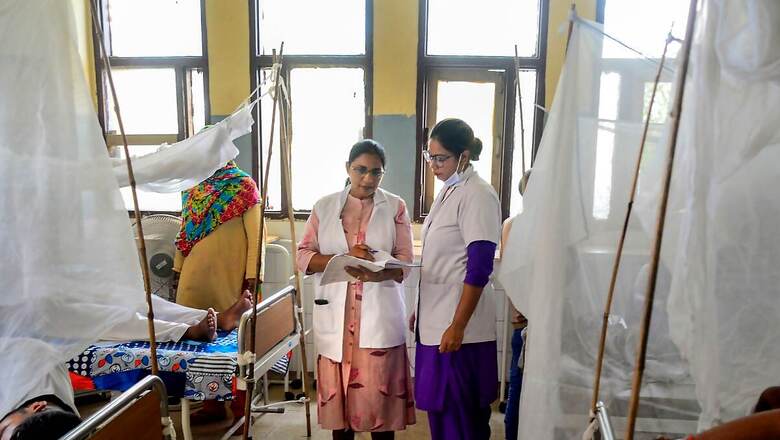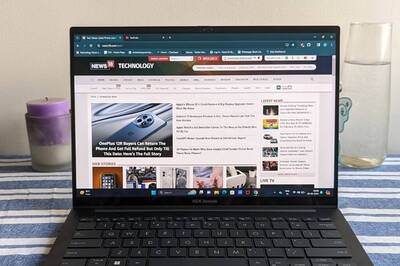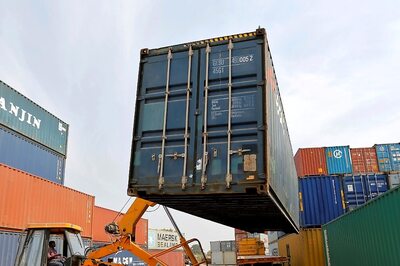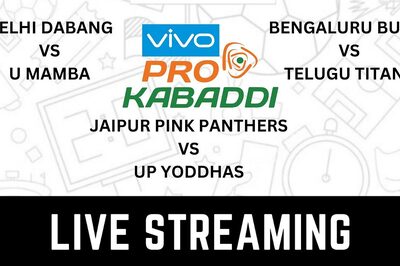
views
India has started experiencing a significant surge in dengue cases, particularly in the southern states. From witnessing up to 10 patients every day to 200 patients now, the extent of the surge in cases varies from state to state and city to city.
While Delhi-NCR is noticing a mild surge, Mumbai and Kolkata are witnessing a moderate spike and southern cities and states are reporting a big jump.
The uptick in cases has been observed since the onset of the monsoon season, which typically exacerbates mosquito-borne diseases due to increased breeding sites for mosquitoes.
According to several doctors News18 spoke to, the symptoms of dengue remain consistent with previous years, but they are observing an increase in cases with severe complications, specifically low blood pressure. Also, many patients – ranging between 20% to 50% of OPD cases – are requiring hospital admission.
The top symptoms include high fever, severe headache, pain behind the eyes, joint and muscle pain, rashes and mild bleeding. Experts explain that these symptoms typically emerge 4-10 days after a mosquito bite and can last between two to 10 days.
Zooming Cases in South India
Dr K Somnath Gupta from Yashoda Hospitals, Hyderabad, told News18 that he has been seeing 200 cases of dengue per week as of early July 2024. “The severity of cases varies, but a substantial number of patients require hospitalisation. In Karnataka, about 20-30% of reported cases need admission due to severe symptoms or complications.”
Gupta believes that, this year, the frequency and severity of the disease has increased due to higher transmission rates. “The current outbreak has seen an uptick in severe cases and complications, potentially due to the co-circulation of multiple dengue serotypes.”
As per the state government data, over 9,000 dengue cases and seven deaths have been reported in Karnataka from January to July this year. Until July 13, 66,298 people were tested for dengue, out of which, a total of 9,082 people tested positive for the fever.
However, the actual figures are estimated to be “at least three times the number”, Dr L Sudarshan Reddy, senior consultant physician at Yashoda Hospitals, told News18. He said that “repeat infections tend to be more severe and often require hospitalization”.
Similarly, Dr Sheela Chakravarthy, Director of Internal Medicine, Fortis Hospital, Bannerghatta Road, Bengaluru, said that she sees five to six dengue cases every day, with two to three patients requiring admissions, which means that almost half of the OPD patients require admission.
“Presently, we have 18 admitted patients, including one critical case. Notably, the number of cases has increased over the past week,” she said.
Chakravarthy highlighted that patients must be examined for danger signs such as low blood pressure and advised people to keep that in check while they are being treated in a home setting.
Dr Tharanath S, infectious diseases specialist at Sparsh Hospital, Yelahanka, Bengaluru, calls the jump in cases over the past month “exponential”.
“Between July 1 and July 19, our OPD has seen nearly 100 cases with clinical symptoms similar to dengue, of which 30% required admission for further medical management due to severe symptoms.”
“While the symptoms of dengue are consistent with the previous years, we are noting an increase in cases with severe complications such as low blood pressure.”
Dengue Status in Delhi-NCR, Kolkata & Mumbai
In July, doctors in Delhi-NCR started noticing a mild surge with up to five patients in their OPDs every day and some patients requiring admission as well.
“Over the past week, our hospital has seen an average of 2-3 dengue patients per day. Since July 1, we have noticed a sharp increase in cases, with around 10-12 severely affected patients requiring hospital admission due to severe symptoms such as low platelet counts and severe dehydration,” Dr Gaurav Jain, senior consultant, Internal Medicine, Narayana Super Speciality Hospital, Dharamshila, New Delhi.
While Jain said that these symptoms are consistent with those seen annually, doctors are observing more complicated cases. “Last week, we admitted five patients, two requiring intravenous fluid supplementation and three managed with oral fluids and medications.”
“Majority of these patients are coming to us in high fever breaching 103-104 degrees,” said Dr Satish Koul, senior director and unit head, Internal Medicine, Fortis Memorial Research Institute, Gurgaon. Koul has started seeing three to four patients every day. “Fever takes four to five days to subside and from the eighth day, patients can expect the start of recovery.”
Howrah-based Narayana Hospital in Kolkata calls the rise in dengue cases “alarming”. “The rise in dengue cases in Kolkata is increasing alarmingly, highlighting the urgent need for taking extra precautions. The situation is gradually worsening with an increase in OPD and emergency dengue cases by 20-25%,” Dr Ramyajit Lahiri, head of the Department of Emergency Medicine.
Doctors believe that dengue is particularly dangerous for individuals with comorbidities such as diabetes, hypertension, or asthma.
“While dengue can hit anyone with no particular subset being more vulnerable, people with medical comorbidities are vulnerable to severe dengue complications,” Dr Harshad Limaye, consultant, Internal Medicine at Nanavati Max Super Speciality Hospital, Mumbai.
“Overall, we are seeing five to seven patients getting admitted every day and many more in OPD. The surge in cases has started getting noticed since the last week.”
However, Limaye advised people not to panic and flock to hospitals. “Dengue is completely manageable at home with paracetamol and hydration. Stay in touch with your family physician and follow the advice.”
According to media reports, Mumbai has reported 513 dengue cases, followed by Nashik with 348 and Kolhapur with 141. Overall, the state has recorded 3,736 dengue cases, with Mumbai, Nashik, and Kolhapur accounting for 26% of these cases.




















Comments
0 comment